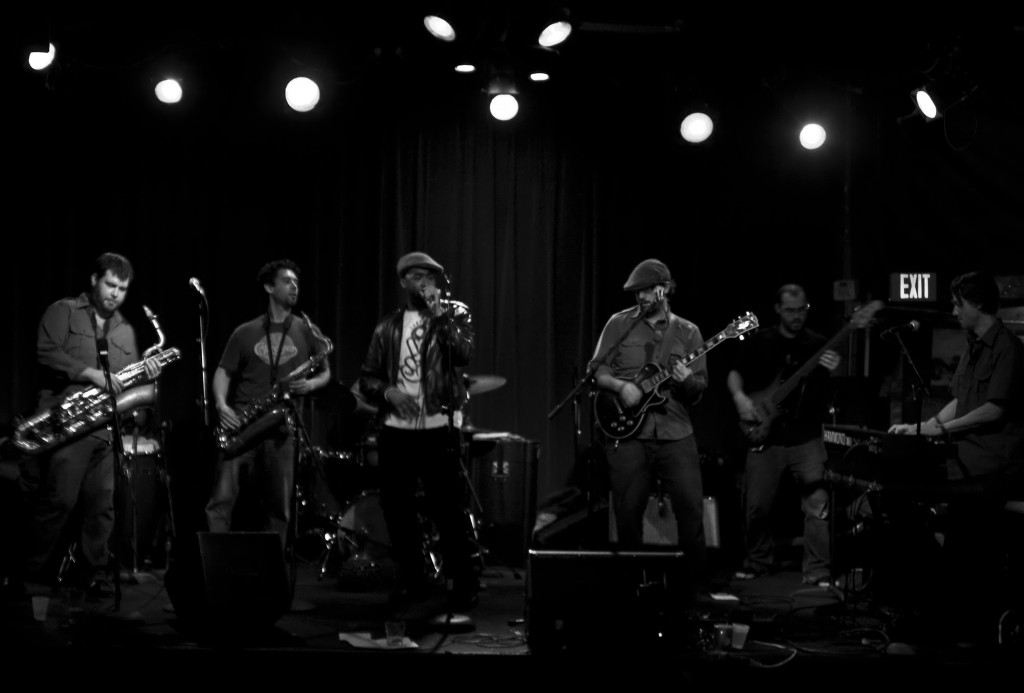While afrobeat has experienced a hip resurgence of late, this is a group that’s been doing it since before it was cool (or as cool as it is today), and one that takes an original approach. As the name implies, Chicago Afrobeat Project has always had the goal of, “breathing the intensity of Chicago’s rich music scene into the infectious sounds of afrobeat.” Infectious. That word is used a lot in relation to this band. Judge for yourself Thursday at the Eastside.
[The Eastside Club Tavern, 9 p.m., 410 E. Fourth Ave., Olympia, 360.357.9985KC Confidential: “Donnelly: Chicago Afrobeat Project at the Bottleneck”
 This article originally appeared on KC Confidential.
This article originally appeared on KC Confidential.
I could hire a band to play my backyard on the sweatiest summer night, this would be it…
Girls would be dancing and twirling and drinking too much. Maracas would be shaking. I would be smoking a Cuban cigar and making sure that the girls were drinking too much. The Chicago Afrobeat Projectwould be cranking out tight funk, rock, jazz, and afro-cuban music.
Too bad this show fell on a chilly night in late October. Judging from the crowd at theBottleneck Friday you would think some no-name singer/songwriter was whining about something-or-other onstage. Some old folks sipped beers and some younger folks kind of swayed lazily back and forth. This silver fox came up to me and chatted me up about the ripping horn section, then quickly segued to a rant on the blatantly corrupt power structure of beltway politics. If ever there was a crowd who needed to be slapped in the mouth, this was it.
I had to get in a shot.
But damn, these Afrobeatists are some funky mofos. Going into the show I didn’t really know what to expect from this band, or what “afrobeat” really was. I was expecting a little less rock, a little more jazz and a little more horn-centric vibe. The band did have two horns – a tenor and a baritone sax – keys, drums, auxiliary percussion, guitar, bass, and sometimes vocals.
As the set progressed a couple of things became crystal clear:
The keyboard player is a mad man. This guy can wail. Both by adding texture to the overall sound and with his impressive improvisational solos. Seriously, seriously folks, worth the price of admission just for that.
And the horn section makes the band.
Especially sweet was the low, low crunchy end of the barry sax on the complex harmonized rhythmic background figures. I would love to see the version of this band with a full horn section – just add a trumpet and a trombone and I’m sold.
This band has some killer chops, they performed like real pros. The guitarist was spot on and super tasteful with his tones; the new-ish vocalist added a nice wrinkle with his chants, call-and-response lyrical style, and overall engaging stage presence; and the bassist laid down a booming foundation to support it all.
What I’m trying to say is, these guys are all really good.
So why did I feel a little let down after the show, not sweaty and tired and drunken? This is a party band, you know? This outfit is tight, but they are dependent on vibe and energy for their live shows. But as hard as the band jammed, as much energy as they brought, the crowd was never quite able to get to the band’s level.
Next time I catch the Chicago Afrobeat Project I’ll make sure to do them justice. I will make sure that it is summertime, at an outdoor venue – say the Crossroads in Kansas City – and if need be I’ll bring my own dancing, twirling girls.
Matthew Donnelly
The Salt Lake Tribune: “Chicago Afrobeat Project continues in spirit of Fela Kuti”
Chicago Afrobeat Project’s performance at The Urban Lounge on Nov. 1 comes at a bright time for Afrobeat music in the United States.
The critically claimed Broadway musical “FELA!” (co-produced by Jay-Z and Will Smith) is in the midst of plans for a national tour, while impressive young bands such as Vampire Weekend and The Budos Band are spreading the joy of Afrobeat to the masses.
“I think it may be moving toward its peak,” said Kevin Ford, keyboardist, producer and founder of Chicago Afrobeat Project, which began in 2002.
“Afrobeat is getting more recognition,” agreed Angelo Garcia, tenor saxophone player of the ensemble. “It could be as popular as hip-hop.”
The proposition that Afrobeat — hard-driving African polyrhythms blended with Western concepts such as spiky guitar licks, muscular bass lines and jazz improvisation — could rival hip-hop for American prominence anytime soon is unlikely.
But there’s no mistaking that the danceable, energetic and combustible sound is ready to accept new converts in Utah.
The collective has toured the Beehive State before, but not since the group added its first permanent vocalist, Squair Blaq. Blaq joined the group about nine months ago, and is featured on Chicago Afrobeat Project’s upcoming album, “Nyash Up,” a collection of covers that further traces the connection between African and Western music.
Ford and Garcia said the addition of an emcee wasn’t necessarily a bow to become more commercial, but rather a way for the instrumental band to better inhabit the spirit of Fela Kuti. He’s the Nigerian singer and bandleader who pioneered Afrobeat in the 1970s before his death in 1997 at age 58.
“We’ve always wanted to do it,” said Davis of adding a singer on top of occasional chants that are part of the group’s sound. “We could never find the right person.”
“We’ve been selective,” Ford said. “We had a mish-mosh of auditions [over the years], and we hadn’t pursued it aggressively.”
But when group members approached Blaq and asked him to audition, they knew they had their musician.
“We had our identity, but we hadn’t had anyone to deliver it,” Ford said. “It was good to have someone who could connect.”
Besides having a frontman who could break down the wall of instrumental music, with Blaq the band was able to convey its political point of view. Kuti was known as a political maverick, and calls for change were just as important as percussion in his brand of Afrobeat.
The band’s liberal viewpoint had come across in songs such as “March of the Uninsured”( which proclaims a chant of “You can’t go to the doctor because you’re uninsured”), but with Blaq the band believes it’s continuing the mission of Kuti. “Our shows are better with [Blaq],” Ford said.
The elevated status of Kuti has shown up in Chicago, with the June 2009 opening of The Shrine, a nightclub in Chicago’s South Loop. The venue takes its name from the personal nightclub of Kuti, which was destroyed in raids from Nigerian soldiers in response to Kuti’s human-rights activism. “I’ve got this feeling that there will be an Afrobeat scene in Chicago,” Ford said.
A large, thriving Afrobeat scene in mostly white-bread Utah is unlikely, but Chicago Afrobeat Project hopes to ignite a desire for more multicultural music throughout its tour.
“When I started, I had never heard of Afrobeat and never heard of Fela,” Davis said. And look at what he and his comrades have done.
dburger@sltrib.com —
Fela the leader
P Chicago Afrobeat Project will perform. After 50 Salt Lake City residents confirm their attendance on the band’s Facebook event for the performance and also “like” the band, Chicago Afrobeat Project will send the 50 guests a download of an unreleased track from the new record.
When • Monday, Nov. 1, at 9 p.m.
Where • Urban Lounge, 241 S. 500 East, Salt Lake City
Tickets • $8 in advance, $10 day of, at SmithsTix and 24Tix
Facebook event • www.tinyurl.com/afrobeat33
